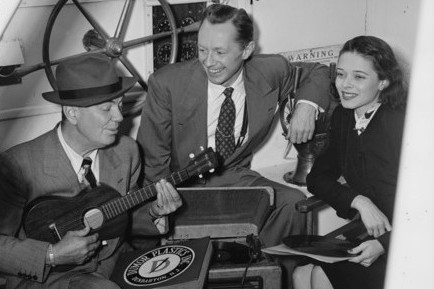Cliff Edwards - The Tragic Story of a Ukulele Superstar
-
 Patrick Vosen
Patrick Vosen - 10/28/2024

You might find it hard to believe, but 100 years ago, musicians were already achieving fame and fortune with the ukulele. One of the first and most significant was Cliff Edwards, better known as “Ukulele Ike”. Never heard of him? I’m not surprised. Even in his hometown of Hannibal, Missouri, hardly anyone remembers him today.
Yet Edwards was one of the biggest stars of his time. He recorded songs that everyone knows today - even though few people realize he was the original performer. Let’s take a journey through time together and get to know this extraordinary personality!
From Small Town to Broadway Star
The story of Cliff Edwards begins on June 14, 1895, in Hannibal, Missouri. As the son of a Missouri Pacific Railroad conductor, his life could have taken a very ordinary path. But Edwards had other plans. He was drawn to music and the stage from an early age. His first performances were in silent movie theaters, where he acted as a kind of one-man orchestra - singing, playing drums, and even making sound effects.
The turning point in his life came from a rather practical problem: as a traveling musician, he couldn’t rely on venues having a piano available. So he turned to the ukulele - an instrument that was still relatively new in the USA at the time. It became his faithful companion, which he lovingly called “my little lamb chop.”
He got his nickname “Ukulele Ike” from a forgetful waiter in Chicago. In 1917, the waiter couldn’t remember his real name and simply called out “Hey, Ike!” - the name stuck.
The First Ukulele Superstar
Edwards developed a completely new style. Unlike the formal singers of his time, he brought jazz and blues elements into his music. His singing voice combined with virtuosic ukulele playing was something people had never heard before. His breakthrough came in 1924 on Broadway, where he performed the number “Fascinating Rhythm” in George Gershwin’s musical “Lady Be Good.”
What followed was a meteoric rise. Edwards recorded over 150 songs and became one of the highest-paid entertainers of his time. Two of his interpretations became absolute classics:
In 1929, he first sang “Singin’ in the Rain” in “The Hollywood Revue” - yes, the very song that later became immortalized by Gene Kelly. Here’s the original clip:
Even more significant was his role as Jiminy Cricket in Disney’s “Pinocchio” (1940). His interpretation of “When You Wish Upon A Star” not only won the Oscar for Best Song but became Disney’s signature melody. Here’s the original clip:
The Tragic Fall of a Star
But Edwards’ story also has a dark side. Despite his immense success, he had great difficulty managing money. Several failed marriages led to costly divorces. Alcohol and drug problems made the situation worse.
The man who once filled the biggest halls and enchanted millions with his voice spent his final years in a nursing home in Hollywood. When he died on July 17, 1971, his body remained unclaimed for three days - nobody wanted to pay for his funeral. Only through the intervention of Disney and the Actors’ Fund of America could he be buried with dignity.
What We Can Learn from Cliff Edwards
Edwards’ story is a classic “rags to riches to rags” drama. But it’s also the story of a musician who forged his own path with innovation and courage. He made the ukulele respectable and showed what this “little lamb chop” could do. Many later artists were inspired by him, including Bing Crosby, who is now famous for his Christmas songs.
When I travel the world today with my ukulele and play in ukulele clubs, I often think of pioneers like Edwards. He paved the way for all the wonderful ukulele communities I get to visit today. Even if hardly anyone in his hometown remembers him - his musical legacy lives on, every time we hear “When You Wish Upon A Star” or pick up our ukuleles.
His story reminds us that success may be fleeting, but true art endures. Perhaps next time you pick up your ukulele or play “Singing in the Rain,” think of “Ukulele Ike” - he would have liked that.
Check out these songs and videos for inspiration!


